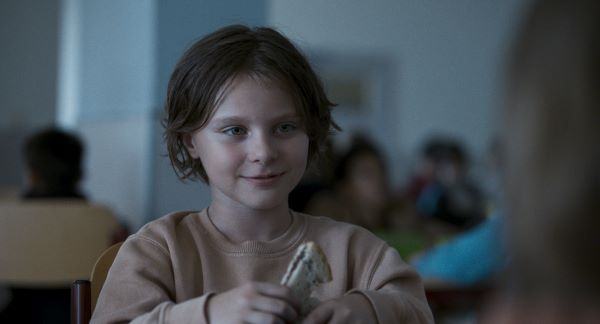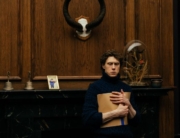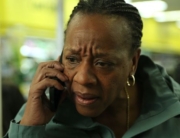![]() A child of seven is desperate not to go to school. Outside she clings to an adult whose face we can’t see, her own face riven with anguish. The first shot sets the tone for Laura Wandel’s debut feature, an unflinching, immersive look at childhood bullying that plunges us deep into a child’s agitated POV. Playground was Belgium’s 2021 submission for the best international film Oscar, and those who submitted it probably counted on its immediately seizing the viewers’ attention. The film did not land a nomination, but they were right on one count: there’s really nothing like this powerful film out there right now.
A child of seven is desperate not to go to school. Outside she clings to an adult whose face we can’t see, her own face riven with anguish. The first shot sets the tone for Laura Wandel’s debut feature, an unflinching, immersive look at childhood bullying that plunges us deep into a child’s agitated POV. Playground was Belgium’s 2021 submission for the best international film Oscar, and those who submitted it probably counted on its immediately seizing the viewers’ attention. The film did not land a nomination, but they were right on one count: there’s really nothing like this powerful film out there right now.
The minute we enter the school, we understand immediately why little Nora (Maya Vanderbeque) hangs back from going in. Filmed from a child’s truncated perspective, the hallway is a melee of noise, careening small bodies, and hulking large ones in the forms of the teachers whose heads are cut off by the camera until they sweep menacingly into frame. Dodging, feinting camerawork mirrors the school’s chaos.
Nora feels small, overlooked, and unheard here. She clings to her taciturn older brother Abel (Günter Duret), who cautions her to leave him alone; her presence attracts the wrong kind of attention from bigger boys who like to dole out scary beatings. The two children’s low status in this harsh world will shame them and pit them against each other. Well-meaning parents’ attempts to interfere only inflame disputes, blowing up misunderstandings into full-blown conflict.
Wandel’s film zeroes in unrelentingly on Nora’s pain and loneliness. Our hopes rise when she is finally allowed a place in a childhood game, and they collapse when classmates turn on her. We ache at her feelings of rejection, and we fear for her when her sadness starts to turn to rage. Disappointment, disbelief, the feeling of being cornered, and finally exhaustion—all of childhood’s powerlessness is here in Vanderbeque’s performance, raw and insurmountable.
Playground’s naturalistic style stays focused on the schoolyard and the classroom, but mysteries dwell elsewhere. Schoolmates mock Nora and Abel’s father (Karim Leklou) for not working. The often truculent dad protests that his job is looking after the children, but the kids are confused by his explanation because they spend all day at school. Why does the father seem ashamed during awkward attempts to reassure his kids? Is there a mother in the picture? What happens when the children are at home? Questions linger at the movie’s edges, deepening the sense of insecurity.
The larger questions the movie asks are, why do human beings treat each other so badly and why do they start so young? Nora’s attempts at understanding take place in some of this stern film’s few calm, undisturbed moments. Having established a rapport with a gentle young teacher, Nora finds quiet time with her alone away from the schoolyard noise. The two talk in near-whispers with their heads finally level, a departure from Playground’s unequal vantage point where grown-up faces lord over kids somewhere off camera. This adult’s rare, kind attention seems to soothe and unnerve the little girl at once. Nora wants to know why the school is such a mean place. How can the cruelty go on? “Because sometimes we don’t know what to do,” the teacher says simply. It’s the only answer to an unanswerable question in this stark, strong, and sorrowful film.







Leave A Comment